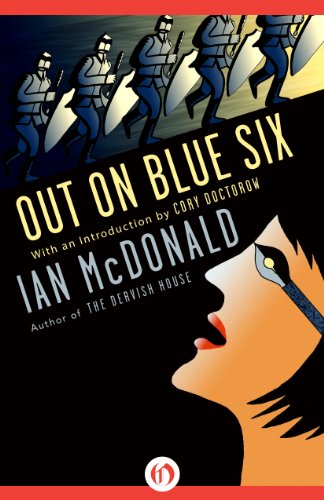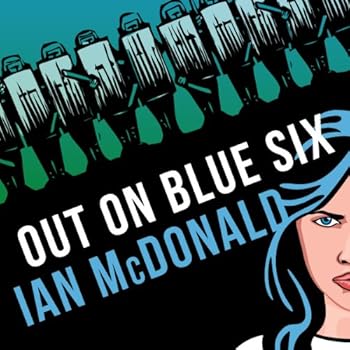
![]() Out On Blue Six by Ian McDonald
Out On Blue Six by Ian McDonald
Courtney Hall is a cartoonist because that’s the job she’s been assigned by the tyrannical government agencies that dictate all of the details of everyone’s life — where they live, who their friends are, who they marry, what job they do. The goal of the government, which consists of such agencies as the Ministry of Pain, the Compassionate Society, and the Love Police, is to analyze every citizen’s genes and personality so that they can be assigned to the lifestyle that will minimize their pain and maximize their happiness, thus creating a populace that is obedient and compliant. The government assures that its dictates are adhered to by monitoring all activity and censoring criticism.
Most people seem content in the Compassionate Society because they like being pain-free, doing a job that they love (even if they’re not good at it) and being married to people who they’re compatible with (even if they don’t love them). But some people, including Courtney Hall, think there must be something more to life than avoiding pain and conflict. If she voices her opinions, or opposes the government’s decisions for her, she’ll be called in for reprogramming and have her mind wiped. When Courtney creates a satirical comic and finds herself on the run, she discovers a group of dissidents living under the city and joins their fight for freedom.
So far Out on Blue Six sounds like a typical dystopian novel. You’re probably expecting something like Nineteen Eighty-Four or Fahrenheit 451 but, to stick with the number-in-the-title theme, Out on Blue Six has more in common with Slaughterhouse-Five than either of those dystopias. It’s bizarre. Really bizarre. In fact, it feels much more like something Philip K. Dick would have written, except that Ian McDonald is a far better stylist.
 The story is strange all the way through, but the weirdest part is when Courtney spends time with the underground rebels. Their “expedition to the end of the world” is surreal and filled with all sorts of oddities such as a six-breasted goddess, a man with no memories, the King of Nebraska, a group of performance artists who call themselves the Raging Apostles, a race of cyborg raccoons, and a computer program that might be God. Through her travels and interactions, Courtney begins to realize what is wrong with her “compassionate” society and how the experience of pain underlies morality and creativity.
The story is strange all the way through, but the weirdest part is when Courtney spends time with the underground rebels. Their “expedition to the end of the world” is surreal and filled with all sorts of oddities such as a six-breasted goddess, a man with no memories, the King of Nebraska, a group of performance artists who call themselves the Raging Apostles, a race of cyborg raccoons, and a computer program that might be God. Through her travels and interactions, Courtney begins to realize what is wrong with her “compassionate” society and how the experience of pain underlies morality and creativity.
Out on Blue Six is wildly creative, beautifully written, often funny, has a clear message, and ends on a hopeful note. Yet it feels disjointed, frenetic, and over-stimulating, like an acid trip (or, at least, what I think an acid trip must feel like). Thus, while I admired the novel and found it fascinating, I didn’t always enjoy it. There were no characters that I cared about and I never felt grounded in McDonald’s world because there was something new and bizarre around every corner. I love weird, but this was weird overload. Still, I’m glad I read Out on Blue Six and some of its language and images will stick with me forever.
I listened to the audio version produced by Audible Studios and read by Jeff Harding. I suspect that narrating this book was extremely difficult. The narrative voice is intrusive, frenzied, chaotic, repetitive, and full of neologisms and sound effects. There are plays, sportscasts, committee meetings, official letters from the government, and talking raccoons. Jeff Harding managed it all brilliantly. It is an impressive performance.



I’m sold on the book by the first half of your review, though slightly worried I might not like it based on your overall reaction to it. Do you think I’d enjoy the audio version enough to try that instead of getting a digital edition? Is the performance good enough to sit through the parts I might otherwise speed through if they became tedious while reading it?
Yes, the performance is excellent. And you might have a very different reaction.
I didn’t mention this in my review, but if you sign up for Kindle Unlimited (free one month trial), this book is available for free and it has the audio attached to it. You can cancel after one month and not owe anything, but the book and audio will disappear when you do that, so make sure to listen before the trial month is over. (I don’t think Kindle Unlimited is worth it because it seems to me that the new stuff they are adding is mostly stuff they publish. I think they put books like this one in there to tempt us, but my trial ends today and I haven’t seen anything added in the past month that I’ve wanted to read.)
Thanks, Kat! I’ll listen to a sample on audio, and if I like that, I’ll still with audible version.